AFLW star Richelle ‘Rocky’ Cranston felt great, but with fast failing kidneys, she was a ticking time bomb
AFLW star Richelle “Rocky” Cranston was at the top of her game before she suddenly went blind in one eye. She had been living with chronic kidney disease — she just didn’t know it.
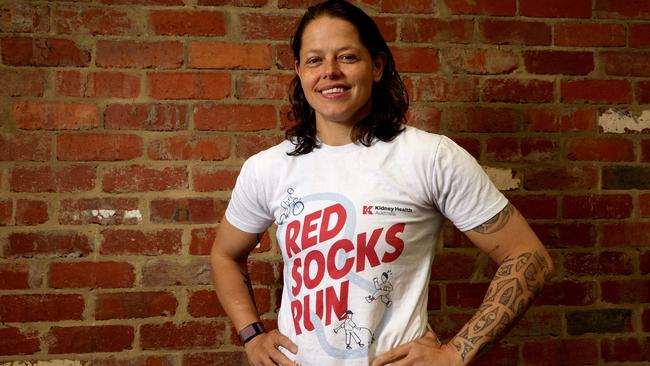
VWeekend
Don't miss out on the headlines from VWeekend. Followed categories will be added to My News.
At her CrossFit gym in Geelong, Richelle “Rocky” Cranston smashes out a set of pull-ups without breaking a sweat. She swings herself up to a bar well above her head in one try. Cranston can push herself up from a headstand to a handstand several times in a row, then walk on her hands.
She is strong, formidable, witty and very friendly.
She doesn’t look like someone who is battling chronic kidney disease.
“When I first got diagnosed, I figured it couldn’t be that bad,” Cranston says.
“I felt great at the time. I didn’t really understand what dialysis was, either, or how bad it was going to get. I was a bit blase about it.”
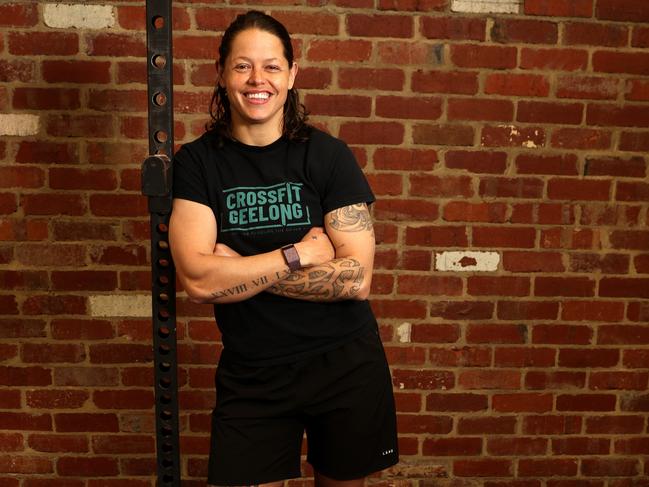
Cranston was an AFLW athlete, having played for the Geelong Cats and Western Bulldogs over her eight-season career. A powerful forward-midfielder, she didn’t know anything was wrong until she suddenly lost vision in one eye.
“I was at footy training,” the now 35-year-old says. “They sent me for some blood tests, then I had to get urine tests, then I was in hospital for a week and a half. It got worse and worse from there – a slow decline.
“My kidneys were at 22 per cent (function) and it was stage four of kidney disease, but I still managed to play four or five years of footy after that point.
“I did everything they told me to do. You have to not have protein, which is so hard for an athlete. I couldn’t have Hydralyte because of the potassium. Basically everything an athlete does can contribute to kidney disease.”
After lasting three years longer than expected without dialysis, Cranston was forced to retire from AFLW last year, as her kidneys had just 12 per cent function. She needed surgery to prepare her for the now nightly dialysis she needs to stay alive.
The surgery was brutal.
In a cruel twist of fate, it was her physical prowess that made it so tough. If her abdominal muscles had been weaker, the surgeon would have had a much easier time tunnelling across them to insert the tube.
“Recovery was rough,” Cranston says. “I got stuck in bed one day because I couldn’t get up, and my big 47kg dog came and helped pull me up.
“I just thought, ‘Oh I love you’. He’s such a beautiful boy.
“I cried my eyes out after that. I was going to be stuck in bed all day because I didn’t have the strength to sit up, and he just came and gave me his collar to pull me up.”
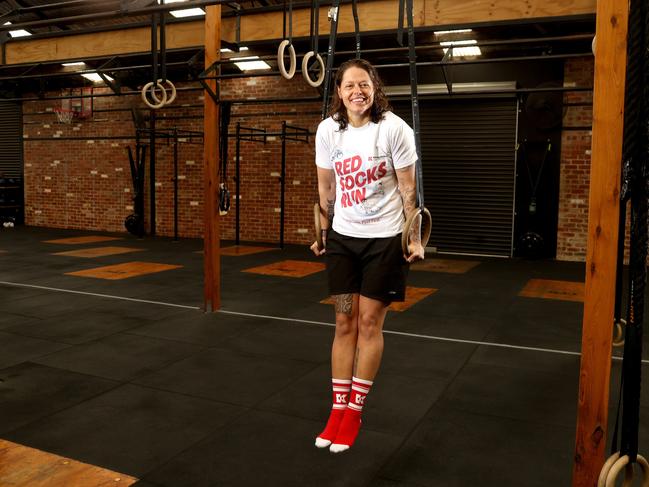
Kidney disease is the ninja of chronic illnesses. A person can lose 90 per cent of their kidney function without experiencing any major symptoms, and there is no cure: only dialysis and transplants.
There are about two million adult Australians living with chronic kidney disease, but a further 1.8 million are completely unaware they have it.
Worse, symptoms are notoriously hard to spot. “For me, all I had was a headache, then I lost the vision in my eye because mine was blood pressure related,” Cranston says.
“My blood pressure went so high that it burst the blood vessels behind my eye. But the crazy thing was that I wasn’t even in pain. I did have itchy skin, which is a big symptom. It feels like little ants crawling under your skin, because there’s a build-up of toxins in your blood.
“I get restless legs, so sometimes I can’t keep them still. You can also get a metallic taste in your mouth sometimes. So, all little things that you wouldn’t really think much of. You don’t even feel that bad – until you do.
“That’s why it’s so important to get kidney checks, because it can be literally impossible to know if they’re working or not.”
Nightly eight-hour dialysis is now a non-negotiable part of Cranston’s life. Each night, she has to set up the station, taking meticulous care that everything is sterile and safe.
“The most annoying thing is just setting it up, because it’s another thing I have to do, and then pack up in the morning,” she says.
“I’ve got to clean everything, get the 6-litre bag, clean my hands for 60 seconds, take so much care with everything. Then if I need to go to the bathroom in the night, then I have to disconnect it and do it all over again half awake.
“You can’t stuff it up, because if you touch anything when you’re not supposed to then it’s game over. You have to probably go to your nurses, get it all sorted. I’ve also broken my tube twice, which was just so annoying.”
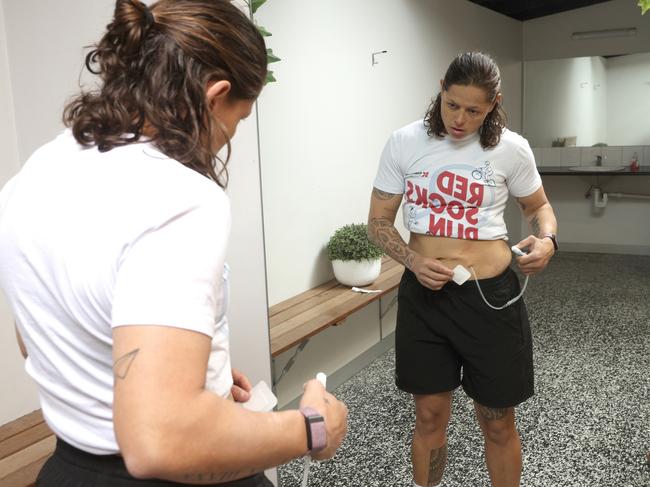
Cranston is on the kidney transplant list but there’s a minimum four-year wait. There are also strict rules to follow in order to get on the list and stay there.
Candidates have to undergo a pap smear, chest x-ray, stomach CT scan, dental check, skin check and a blood glucose test, as well as cutting out alcohol and smoking. Essentially, with donated kidneys so far and few between, doctors can’t afford to “waste” them on people who are not healthy enough.
It’s ironic, Cranston says, because with the exception of failing kidneys, you’d be hard-pressed to find a healthier person than someone on the transplant list.
She also says there is nowhere near enough understanding about kidney disease among Australians.
“Just go and get a kidney test, because (the disease) is so, so common. I’ve heard of people getting to 6 per cent function without any symptoms, then suddenly they’re on emergency dialysis to save their life,” Cranston says.
“It’s a scary disease that can sneak up on you. Seriously, just get checked. It’s so easy to do at the GP because they just run a blood test, urine test and a blood pressure test, and that’s it.”
Even when people do get kidney transplants, the daily grind doesn’t change much. It’s still a cycle of daily medication, twice-yearly appointments at the Royal Melbourne Hospital and frequent check-ups.
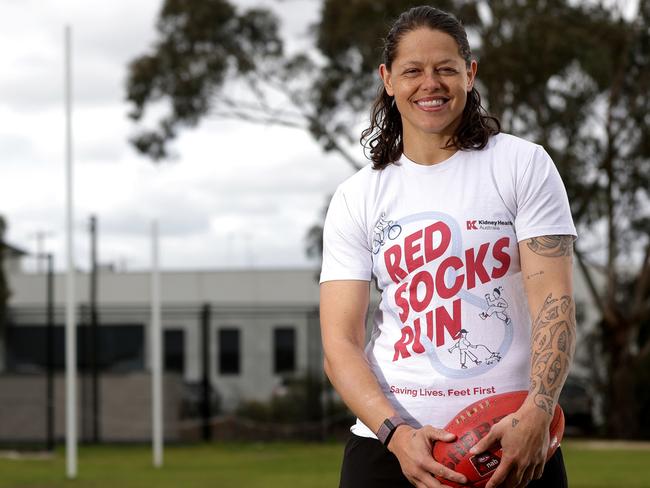
Staring down the barrel of this reality, Cranston says it’s confronting but she has never been a quitter.
“It’s just something I have to deal with. I don’t want to wallow and always ask ‘Why me?’ – that’s so boring.
“Some days I find it annoying, but mostly I’m pretty positive.
“I’m really lucky to have my support system around me. I have my partner, my business partner, my gym community, my dogs. It’d be really hard if I didn’t have that.
“I’ve got a lot of positive things in my life. I think the only thing is that I had to retire from footy – that’s the only thing where I was really like ‘damn it’.
“But even then, I got eight really good years and some people will only get one or two.”
Regardless of how functional her kidneys are, Cranston is a born athlete. When she was forced to retire from footy she knew she needed a team sport in her life, so she took up baseball. In her first season, she was awarded the most valuable player title.
Even though kidney disease has robbed Cranston of the sport she loves, she won’t sit around moping. She sees herself as fortunate to live in a time in which dialysis is available, refusing to succumb to a victim mentality.
Cranston wants Australians to learn about kidney disease, to get their kidneys checked and to stop the stigma about the disease.



